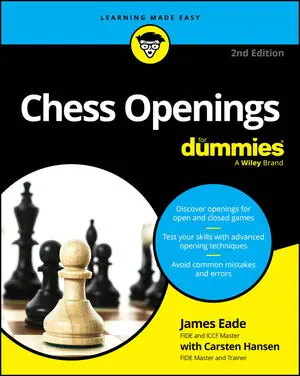For help with the chess notation used on this cheat sheet, see Understanding Chess Notation.
Opening up the board with open chess games
In chess, open games are defined by the moves 1.e4 e5. Many of these chess matches feature open files, ranks, or diagonals that facilitate piece movement. People who enjoy attacking early and often are typically drawn to open games.
| Opening Name | Opening Moves |
|---|---|
| Alapin’s Opening | 1.e4 e5 2.Ne2 |
| Bishop’s Opening | 1.e4 e5 2.Bc4 |
| Damiano Defense | 1.e4 e5 2.Nf3 f6 |
| Danish Gambit | 1.e4 e5 2.d4 exd4 3.c3 dxc3 4.Bc4 |
| Evans Gambit | 1.e4 e5 2.Nf3 Nc6 3.Bc4 Bc5 4.b4 |
| Elephant Gambit | 1.e4 e5 2.Nf3 Nc6 3.c3 |
| Falkbeer Counter-Gambit | 1.e4 e5 2.f4 d5 |
| Four Knights Game | 1.e4 e5 2.Nf3 Nc6 3.Nc3 Nf6 |
| Giuoco Piano | 1.e4 e5 2.Nf3 Nc6 3.Bc4 Bc5 |
| Göring Gambit | 1.e4 e5 2.Nf3 Nc6 3.d4 exd4 4.c3 |
| Greco Counter Gambit (or Latvian Gambit) | 1.e4 e5 2.Nf3 f5 |
| Hungarian Defense | 1.e4 e5 2.Nf3 Nc6 3.Bc4 Be7 |
| King’s Gambit | 1.e4 e5 2.f4 |
| Petroff Defense | 1.e4 e5 2.Nf3 Nf6 |
| Philidor Defense | 1.e4 e5 2.Nf3 d6 |
| Queen’s Pawn Counter-Gambit | 1.e4 e5 2.Nf3 d5 |
| Ruy López | 1.e4 e5 2.Nf3 Nc6 3.Bb5 |
| Scandinavian Defense (or Center Counter Defense) | 1.e4 d5 |
| Scotch Gambit | 1.e4 e5 2.Nf3 Nc6 3.d4 exd4 4.Bc4 |
| Scotch Game | 1.e4 e5 2.Nf3 Nc6 3.d4 exd4 4.Nxd4 |
| Three Knights Game | 1.e4 e5 2.Nf3 Nc6 3.Nc3 Bb4 |
| Two Knights Defense | 1.e4 e5 2.Nf3 Nc6 3.Bc4 Nf6 |
| Vienna Game | 1.e4 e5 2.Nc3 |
Picking a fight with semi-open chess games
Semi-open chess games are those in which White plays 1.e4, but Black doesn’t respond with 1.…e5. These chess openings typically result in asymmetrical games where finding the right plan may be difficult. Players who like complications, and mixing it up, often adopt a semi-open defense.
| Opening Name | Opening Moves |
|---|---|
| Alekhine’s Defense | 1.e4 Nf6 |
| Caro-Kann Defense | 1.e4 c6 |
| French Defense | 1.e4 e6 |
| Modern Defense | 1.e4 g6 |
| Nimzowitsch Defense | 1.e4 Nc6 |
| Owen Defense | 1.e4 b6 |
| Pirc Defense | 1.e4 d6 |
| Sicilian Defense | 1.e4 c5 |
Applying strategy with closed chess games
Chess openings that occur after the moves 1.d4 d5 often result in closed games. These games emphasize maneuvering because pawn exchanges are delayed. Players who prefer strategic clashes to tactical melees like closed chess games.
| Opening Name | Opening Moves |
|---|---|
| Albin Counter-Gambit | 1.d4 d5 2.c4 e5 3.dxe5 d4 |
| Blackmar-Diemer Gambit | 1.d4 d5 2.e4 dxe4 3.f3 |
| Chigorin Defense | 1.d4 d5 2.c4 Nc6 |
| Colle System | 1.d4 d5 2.Nf3 Nf6 3.e3 c5 4.c3 |
| London System | 1.d4 d5 2.Nf3 Nf6 3.Bf4 |
| Queen’s Gambit Accepted | 1.d4 d5 2.c4 dxc4 |
| Queen’s Gambit Declined | 1.d4 d5 2.c4 e6 |
| Slav Defense | 1.d4 d5 2.c4 c6 |
Restricting movement with semi-closed chess games
Semi-closed chess games are those in which White plays 1.d4 and Black responds with anything other than 1.…d5. As with semi-open games, these openings can result in asymmetrical positions that can become quite complicated. They appeal to the player who likes to counterattack.
| Opening Name | Opening Moves |
|---|---|
| Benko Gambit | 1.d4 Nf6 2.c4 c5 3.d5 b5 |
| Benoni Defense | 1.d4 Nf6 2.c4 c5 |
| Blumenfeld Gambit | 1.d4 Nf6 2.c4 e6 3.Nf3 c5 4.d5 b5 |
| Bogo-Indian Defense | 1.d4 Nf6 2.c4 e6 3.Nf3 Bb4+ |
| Budapest Gambit | 1.d4 Nf6 2.c4 e5 |
| Catalan System | 1.d4 d5 2.c4 e6 3.Nf3 Nf6 4.g3 |
| Döry Defense | 1.d4 Nf6 2.c4 e6 3.Nf3 Ne4 |
| Dutch Defense | 1.d4 f5 |
| Grünfeld Defense | 1.d4 Nf6 2.c4 g6 3.Nc3 d5 |
| King’s Indian Defense | 1.d4 Nf6 2.c4 g6 3.Nc3 Bg7 |
| Nimzo-Indian Defense | 1.d4 Nf6 2.c4 e6 3.Nc3 Bb4 |
| Old Indian Defense | 1.d4 Nf6 2.c4 d6 |
| Queen’s Indian Defense | 1.d4 Nf6 2.c4 e6 3.Nf3 b6 |
| Torre Attack | 1.d4 Nf6 2.Nf3 e6 3.Bg5 |
| Trompowsky Attack | 1.d4 Nf6 2.Bg5 |
| Veresov Attack | 1.d4 d5 2.Nc3 Nf6 3.Bg5 |
Favoring the sides with flank chess games
In chess, the openings for flank games avoid or delay moving either the d-pawn or the e-pawn to the fourth rank. They appeal to chess players who want to play their system regardless of how Black responds.
| Opening Name | Opening Moves |
|---|---|
| Anderssen Opening | 1.a3 |
| Barcza System | 1.Nf3 d5 2.g3 |
| Bird Opening | 1.f4 |
| Dunst Opening | 1.Nc3 |
| Durkin Opening | 1.Na3 |
| English Opening | 1.c4 |
| From Gambit | 1.f4 e5 |
| Grob Attack | 1.g4 |
| King’s Fianchetto | 1.g3 |
| Larsen Opening | 1.b3 |
| Réti Opening | 1.Nf3 d5 2.c4 |
| Saragossa Opening | 1.c3 |
| Sokolsky’s Opening | 1.b4 |





